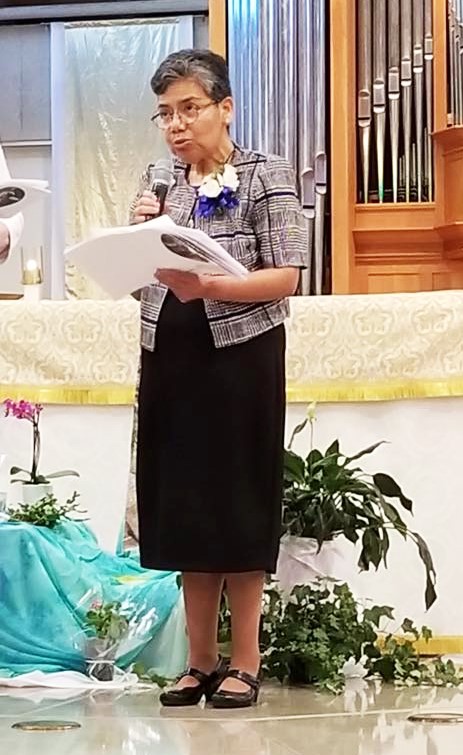
Sister Maria Gomez professes her final vows in Dallas, Texas, in 2019.
In October 2020, three of our newer members participated in the NRVC Convocation together with the Vocation Team and several members of SSND leadership. All participating newer members were asked to write an essay responding to one of several questions related to themes of community life, intergenerational and intercultural living and hope for the future. We are pleased to share with you this essay by Sister Maria Gomez.
How have you experienced interculturality as a member of a religious community, and does this give you hope amid the challenges?
As a member of the School Sisters of Notre Dame, an international congregation, I have experienced interculturality by meeting several sisters from different ethnicities and living with them in community. During my formation period as a postulant, I lived with four Anglo sisters who took the time to ask about my Mexican-American upbringing. We mutually shared our expectations of living together by discussing topics such as our tastes in food, household responsibilities and prayer times. In my novitiate community, one of the sisters was Latina and my director was bilingual in English and Spanish. We lived in a wing of a large convent so I was able to interact with sisters of different cultures. During the apostolic phase of the novitiate, I chose a site that would be challenging. I chose to live in a community with four Anglo sisters at Fort Yates, North Dakota. This ministry exposed me to the Native American culture and to their joys and struggles. My apostolic ministry along with opportunities to attend several congregational events in different parts of the country broadened my intercultural experiences. These experiences enabled me to meet more of my sisters who were culturally different from me.
After first vows, I moved to Dallas to begin my life as a consecrated woman religious. This move was challenging to me as I had grown up in a small Texas town. The freeways were daunting, so I quickly learned alternate routes through city streets. I lived in community with three Anglo sisters who were supportive in welcoming me as a new member. I have since lived in other communities where I continued to be the lone Latina sister. I believe that a willingness to communicate and to share about ourselves is necessary for a life-giving community. As an introvert, I found it difficult at first, but now feel more at ease in conversing with my community members. My community members and I have shared about our family upbringings and about some of our cultural traditions. These conversations have helped us to understand the reasons behind our behaviors or beliefs.
In 2019, I professed my final vows in Dallas. The presence of several sisters from different parts of the United States and two temporary professed sisters from Japan was a blessing. The presiding priest later told me that he was pleased to see the diversity of cultures among my sisters.
I am hopeful that community members can live interculturally amid any challenges that may arise. I believe that my congregation truly strives to value diversity and to see the goodness of each individual. We strive to bring all to the oneness of God as stated in our constitution You Are Sent. Thus, I feel that each of us strives to respect and empower our community members and those persons whom we encounter in our ministries. Because our constitution and our Directional Statement Love Gives Everything embrace interculturality, I am hopeful that each sister will continue to grow in her acceptance of the “other.” I am hopeful that each of us will truly listen to each other’s stories. Whatever challenges may emerge, my hope is that we will risk being vulnerable with one another. As our Foundress Mother Theresa of Jesus Gerhardinger stated, “All the works of God proceed slowly and in pain; but then, their roots are the sturdier and their flowering the lovelier.”
To view a video reflection by Sister Maria, click here.
Read the reflection by Sister Limétèze Pierre-Gilles.
